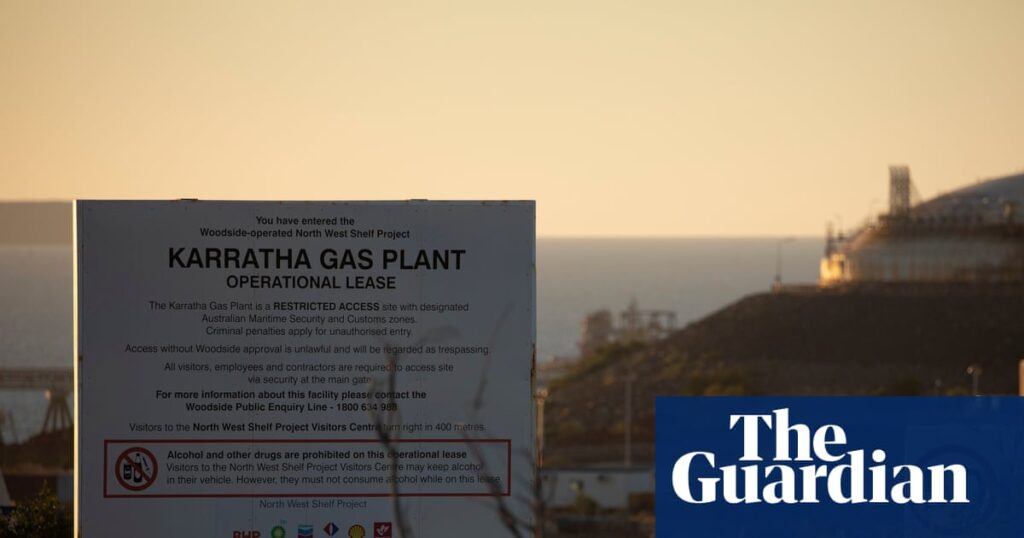
The Australian government has given the green light to extend the North West Shelf gas project until 2070, sparking a fierce debate over environmental and cultural impacts. The decision includes conditions to protect over one million pieces of ancient Indigenous rock art near the site, but has been met with criticism from climate activists and conservation groups.
Climate campaigners have labeled the extension a “carbon bomb,” arguing it contradicts global climate goals. The approval, announced on Friday, drew sharp rebukes from conservationists and the Greens, who called it a “betrayal” of Australians seeking climate action.
Government Conditions and Indigenous Concerns
The federal environment minister, Murray Watt, initially proposed the approval in May. Since then, discussions with Woodside Energy have focused on conditions regarding nitrous oxide emissions, although specifics were not disclosed at the time. The extension permits Woodside to continue operations at its Karratha plant, which processes and liquefies gas for export, until 2070.
Watt confirmed the approval, stating that 48 conditions were imposed on Woodside to monitor and limit industrial emissions, including nitrous oxide. “We are confident the conditions we have set are the right ones to protect jobs and economic opportunities and to protect the rock art,” he asserted.
“Emissions of gases including nitrous oxides and sulphur dioxide will be capped and then reduced. Nitrogen oxide emissions must decrease by 60% by 2030 and 90% by 2061, with similar targets for sulphur oxide gases.”
The Karratha plant is adjacent to the Murujuga Indigenous rock art complex, home to over one million petroglyphs dating back 50,000 years. Critics argue that emissions from the gas plant damage the rock art, but state-backed scientific monitoring has largely dismissed these claims.
Heritage Protection and Cultural Significance
The Murujuga complex was granted world heritage status in July after a prolonged campaign by traditional owners. UN advisers described it as a “manifestation of creative genius, inscribed in the landscape since deep time.” Despite this, the federal government lobbied to overturn UN recommendations that the nomination be delayed until industrial emissions ceased.
On Friday, the government also granted “partial” protection under the Aboriginal and Torres Strait Islander Heritage Protection Act, following a request from traditional owner Raelene Cooper over three years ago. The declaration prohibits moving, damaging, or defacing objects in the protected area, but excludes damage from “industrial gaseous emissions.”
Cooper criticized the decision, stating it would “hang around Albanese’s neck for the remainder of his leadership.” She expressed disappointment in a statement through Save Our Songlines, calling the decision “a betrayal of Aboriginal people… a betrayal of all Australians.”
“This is not just destroying Murujuga country, but will impact communities all around the world. It is a shameful act and a shameful decision,” Cooper said.
Peter Hicks, chair of the Murujuga Aboriginal Corporation, which represents the area’s traditional custodians, acknowledged the declaration as an additional protective measure for a site of immense cultural significance.
Environmental and Political Reactions
Conservation groups have condemned the North West Shelf project as the most polluting in the southern hemisphere, with estimated total emissions exceeding 4 billion tonnes of CO2-equivalent. Gavan McFadzean of the Australian Conservation Foundation expressed disbelief at the government’s decision, stating it “beggars belief that the Albanese government would choose to detonate this carbon bomb.”
“With this decision, Prime Minister Albanese has betrayed Australians who voted for him, believing he was serious about acting on climate change.”
Woodside’s reports indicate the project extension will emit 87.9 million tonnes of CO2-equivalent annually, including emissions from gas sold and burned overseas. This accounts for roughly 20% of Australia’s current annual carbon footprint.
Woodside is also pursuing state and federal approvals to drill for gas in the Browse Basin and around Scott Reef, fueling the extended Karratha plant. Liz Westcott, Woodside’s chief operating officer in Australia, welcomed the approval, stating it “provides certainty for the ongoing operation of the North West Shelf Project, so it can continue to provide reliable energy supplies as it has for more than 40 years.”
Bill Hare, CEO of Climate Analytics, criticized the approval as dangerous, claiming it “gaslights the nation, rejects climate science, undermines the ability of the world to achieve the Paris agreement’s 1.5C warming limit, and is a slap in the face of our Pacific island neighbors.”
The Australian Greens and other environmental advocates have similarly denounced the decision as “a betrayal and a disastrous decision for the future of our planet,” accusing the government of compromising its credibility on climate protection.
As the debate continues, the implications of this decision will likely resonate both domestically and internationally, with potential legal challenges and heightened scrutiny of Australia’s climate commitments.






